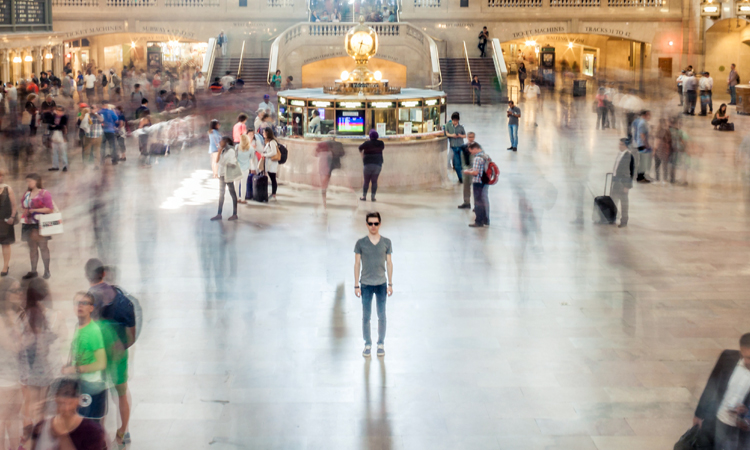A distinguishing characteristic of loneliness—and part of what makes it so difficult to overcome—is that, like depression, loneliness feeds on itself. Sadness in the absence of friends can increase stress, decrease self-esteem and promote an attitude of worthlessness, hopelessness and despair. More than that, it can adversely affect health.
Clinical research about loneliness has shown that as humans we literally need social connections to survive. John Cacioppo, University of Chicago social neuroscientist and a leading expert on loneliness, advises, “For a social species, to be on the edge of the social perimeter is to be in a dangerous position. The brain goes into a self-preservation state that brings with it a lot of unwanted effects.” In fact, Cacioppo’s research suggests that loneliness can alter gene expression, and in animals even affect levels of the neurotransmitter, dopamine.
Compounded physical effects of self-preservation mode activate the brain’s survival mechanism and lead to include increased risk of suicide, higher levels of perceived stress, increased stress hormones and blood pressure, and decreased quality of sleep. Dr Sanjay Gupta, Chief Medical Correspondent for CNN, explains that when loneliness (experienced by 60 million Americans) becomes chronic major health issues arise, some as threatening as obesity.
In an Everyday Health article Gupta writes, “The combination of toxic effects can impair cognitive performance, compromise the immune system, and increase the risk for vascular, inflammatory, and heart disease. Studies show that loneliness increases the risk for early death by 45% and the chance of developing dementia in later life by 64%.”
Clearly, downshifting from the high-stress landscape of loneliness to a more low-stress environment of social connection benefits both mental and physical health. Gupta’s suggestions include the three-step process of 1) recognizing the loneliness, 2) understanding what loneliness is doing to your mind and body, and 3) responding by finding safe ways to reconnect.
For lonely people, the first two steps can seem relatively easy to approach: They can be accomplished alone through a process of mindful self compassion and research. The third step, however, can pose challenging obstacles, especially in light of the prevailing research and ideology that lonely people stay lonely because they lack social skills. With decreased fluency in how to be social the process of discovering how to safely reconnect could be not only disturbingly uncomfortable but flat out unattainable.
The new loneliness theory
Luckily, recent research published in Personality and Social Psychology Bulletin revealed surprising data about lonely people: Disproving the prevailing philosophy that lonely people stay lonely because they lack social skills a new study found that the social skills of lonely people are finely tuned (in some instances more adept than non-lonely people) but that their inability to be social is largely driven by performance anxiety. According to the researchers, the study results suggest “that lonely individuals may not need to acquire social skills to escape loneliness; instead, they must learn to cope with performance anxiety in interpersonal interactions.”
If the real antidote to loneliness lies in reducing anxiety in social situations (versus increasing social skills) then Gupta’s method needs a Phase Two. It’s important to be self-aware and cognizant of The Loneliness Problem; it’s also necessary to approach its resolution through internal change first before attempting to change external relations. Two powerful ways to do that include:
Self-acceptance exercises: The depression experienced in loneliness easily brings on feelings of low of self-worth that naturally lead to hypercritical self-assessments. On the other had, self-acceptance reduces hypercritical stress and opens pathways to feeling more comfortable alone with oneself—an attitude that lays the foundation for feeling more comfortable around others. Self-acceptance exercises include forgiveness of perceived flaws, celebrating your strengths and fostering a connection with your Ideal (Higher) Self.
Relaxation techniques for anxiety: Feeling less stress in social situations begins with feeling less stress in isolated moments. Practicing such relaxation techniques for anxiety as meditation, breathwork, yoga and mindfulness lowers stress hormones and increases feelings of wellbeing that promote a sensation of safety. Developing this as a constant daily practice not only trains the mind, brain and body to operate from this place of calm and safety but also provides a grounded, anti-anxiety sensation from which to approach social interaction.
You can think “I hate my life” because you’re alone and see no way to change your situation, especially if all of the suggestions above don’t resonate with you. In that case, this final idea may feel more doable: Reduce social performance anxiety by using your imagination. Think ahead: Repeatedly play a short movie in your mind about how you will look, feel, behave, act and succeed in creating comfortable, connected social interactions. This kind of repetitive training helps your brain know what you want it to do and learn how to do so more efficiently.
Click here to see Rose’s tips for healthy and happy relationships

